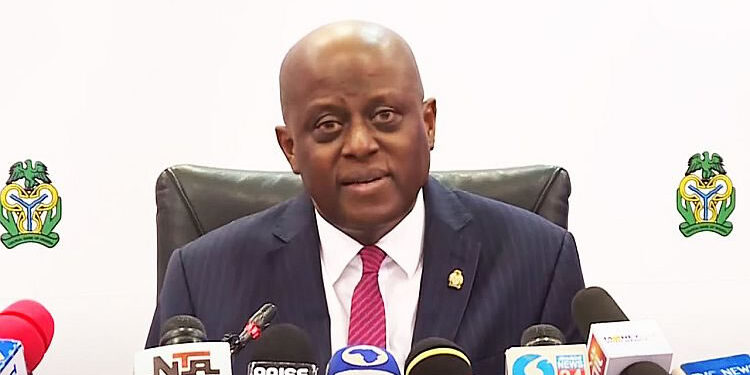The Central Bank of Nigeria (CBN) has decided to keep the benchmark interest rate steady at 27.5 percent, even as January’s inflation figures showed a notable decline under the newly adopted rebasing method.
CBN Governor Olayemi Cardoso announced this decision following the conclusion of the two-day Monetary Policy Committee (MPC) meeting held in Abuja on Thursday, 20 February.
Cardoso explained that the committee, after its 299th session to evaluate recent economic trends and assess potential risks for 2025, reached a unanimous agreement to maintain all existing policy measures.
He confirmed that all 12 committee members participated in the deliberations.
As part of the decision, the committee kept the monetary policy rate at 27.5 percent, often referred to as the benchmark interest rate.
It also upheld the asymmetric corridor around the MPR at +500/-100 basis points, maintained the cash reserve ratio (CRR) at 50 percent for deposit money banks, and kept the CRR for merchant banks at 16 percent.
Additionally, the liquidity ratio was left unchanged at 30 percent, Cardoso announced.
“At this meeting, the Monetary Policy Committee noted with satisfaction recent macroeconomic developments, which are expected to positively impact price dynamics in the near to medium term.
“These include the stability in the foreign exchange market, with the resultant appreciation of the exchange rate, and the gradual moderation in the price of PMS (premium motor spirit),” Cardoso said.
Despite the positive outlook, he warned that the committee remained aware of persistent inflationary risks, primarily driven by rising food costs.
Cardoso pointed out that the committee also acknowledged the recent rebasing of the Consumer Price Index (CPI) by the National Bureau of Statistics (NBS), which adjusted the weighting of goods and services in line with current spending patterns.
“The committee further noted that, as the federal government continues to invest in PMS and security in food-producing communities—supported by other measures to enhance food supply—food prices are expected to continue to moderate,” Cardoso said.
Since April 2022, when the benchmark interest rate stood at 11.5 percent, the CBN has steadily raised rates to curb inflation, according to The ICIR’s findings.
Inflation has worsened over time, particularly after President Bola Tinubu took office on 29 May 2023, driven by his administration’s decision to end fuel subsidies and allow the naira to float freely.
Between May 2023 and December 2024, the headline inflation rate surged from 22.4 percent to 34.8 percent.
This surge has placed significant pressure on households and businesses, leading to higher costs for food, goods, energy, and transportation, as well as a general economic slowdown.
However, with the NBS’s recent rebasing exercise, headline inflation eased to 24.48 percent year-on-year in January.



































